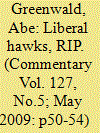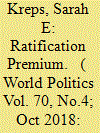| Srl | Item |
| 1 |
ID:
099199


|
|
|
| 2 |
ID:
087984


|
|
|
|
|
| Publication |
2009.
|
| Summary/Abstract |
The unfortunate tale of an intellectual tendency taht, even by its own admission, seems to have gotten everythin wrong
|
|
|
|
|
|
|
|
|
|
|
|
|
|
|
|
| 3 |
ID:
192024


|
|
|
|
|
| Summary/Abstract |
The conventional wisdom in international relations holds that an actor’s past record of keeping her word determines her cooperative credibility, and that mutual perceptions of credibility are essential in sustaining cooperation. Yet competing reputation-skeptic and psychological perspectives dispute this conventional wisdom, suggesting that assessments of cooperative credibility result from observers’ judgments about the other’s capabilities and interests or observers’ foreign policy orientations. How do observers assess others’ cooperative credibility? We field a nationally representative survey experiment asking 2,953 Americans to evaluate a hypothetical coercer’s commitment to lift sanctions on a would-be proliferator in exchange for the latter dismantling its nascent nuclear program. We vary the coercer’s previous behavior plus several other contextual factors. We find that respondents’ hawkishness interacts with the coercer’s past actions to shape respondents’ credibility assessments and their support for the proliferator accepting the proposal, with substantial implications for theories of misperception and bargaining.
|
|
|
|
|
|
|
|
|
|
|
|
|
|
|
|
| 4 |
ID:
161965


|
|
|
|
|
| Summary/Abstract |
This article examines the effect of leaders’ foreign policy preferences on their ability to pursue and ratify arms control agreements. Does it take a “Nixon to go to China,” with hawks more effective than doves, when it comes to the domestic politics of treaty ratification? The authors observe that the theoretical logic correctly identifies an asymmetry between hawkish and dovish presidents, with the latter facing a credibility gap in advocating arms reductions. Although existing accounts assume leaders are captives of their type, the authors argue that dovish executives can overcome their credibility gap by obtaining the endorsement of informed legislators. These executives do so by paying a ratification premium, usually in the form of increased defense effort in areas not covered by the treaty. As a result, doves do not necessarily face a lower rate of success at the ratification stage; their disadvantage manifests itself primarily in the higher premium needed to obtain the same level of support as hawkish executives. The article demonstrates this argument through a formal model and tests the implications with paired comparisons of major arms control treaties in the Cold War and post–Cold War periods. The argument helps to resolve the Nixon-to-China theoretical debate. It shows that dovish leaders are not necessarily captives of their type because they can deploy side payments to achieve their policy goals. It also explains important puzzling features of the arms control record.
|
|
|
|
|
|
|
|
|
|
|
|
|
|
|
|